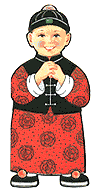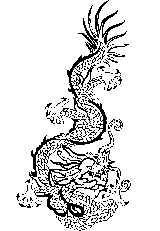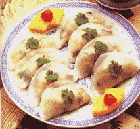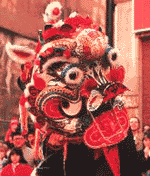January-Spring Festival(春节)
(单词翻译:单击)
| Spring Festival | ||||||||||||||||||||||||
| The New Moon on the first day of the new year-- the full moon 15 days later | ||||||||||||||||||||||||
|
Chinese New Year starts with theNew Moon(新月)on the first day of the new year and ends on thefull moon(满月)15 days later. The 15th day of the new year is called theLantern Festival(元宵节), which is celebrated1 at night with lantern displays and children carrying lanterns in a parade. The Chinese calendar is based on a combination of lunar and solar movements. Thelunar cycle(月运周期)is about 29.5 days. In order to "catch up" with the solar calendar the Chinese insert an extra month once every few years (seven years out of a 19-yearcycle). This is the same as adding an extra day onleap year(闰年). This is why, according to the solar calendar, the Chinese New Year falls on a different date each year. New Year's Eve and New Year's Day are celebrated as a family affair, a time of reunion and thanksgiving. The celebration was traditionally highlighted with a religious ceremony given in honor ofHeaven and Earth(万物), the gods of the household and the family ancestors. The sacrifice to the ancestors, the most vital of all therituals(仪式), united the living members with those who had passed away. Departed relatives are remembered with great respect because they were responsible for laying the foundations for the fortune and glory of the family. The presence of the ancestors is acknowledged on New Year's Eve with a dinner arranged for them at the family banquet table. The spirits of the ancestors, together with the living, celebrate the onset2 of the New Year as one great community. The communal4 feast called "surrounding the stove" or weilu. It symbolizes6 family unity3 and honors the past and present generations.
The Chinese New Year is now popularly known as the Spring Festival because it starts from the Begining of Spring (the first of the twenty-four terms in coodination with the changes of Nature). Its origin is too old to be traced. Several explanations are hanging around. All agree, however, that the word Nian, which in modern Chinese solely7 means "year", was originally the name of a monster beast that started to prey8 on people the night before the beginning of a new year. One legend goes that the beast Nian had a very big mouth that would swallow a great many people with one bite. People were very scared. One day, an old man came to their rescue, offering to subdue9 Nian. To Nian he said, "I hear say that you are very capable, but can you swallow the other beasts of prey on earth instead of people who are by no means of your worthy10 opponents?" So, it did swallow many of the beasts of prey on earth that also harrassed people and their domestic animals from time to time. After that, the old man disappeared riding the beast Nian. He turned out to be an immortal11 god. Now that Nian is gone and other beasts of prey are also scared into forests, people begin to enjoy their peaceful life. Before the old man left, he had told people to put up red paper decorations on their windows and doors at each year's end to scare away Nian in case it sneaked12 back again, because red is the color the beast feared the most. From then on, the tradition of observing the conquest of Nian is carried on from generation to generation. The term "Guo Nian", which may mean "Survive the Nian" becomes today "Celebrate the (New) Year" as the word "guo" in Chinese having both the meaning of "pass-over" and "observe". The custom of putting up red paper and firing fire-crackers to scare away Nian should it have a chance to run loose is still around. However, people today have long forgotten why they are doing all this, except that they feel the color and the sound add to the excitement of the celebration. Traditional New Year Foods
On New Year's Day, the Chinese family will eat a vegetarian13 dish called jai. Although the various ingredients in jai are root vegetables or fibrous vegetables, many people attribute various superstitious14 aspects to them. Other foods include a whole fish, to represent togetherness and abundance, and a chicken for prosperity. The chicken must be presented with a head, tail and feet to symbolize5 completeness. Noodles should be uncut, as they represent long life. The 15-Day Celebration of Chinese New Year The first day of the Lunar New Year is "the welcoming of the gods of the heavens and earth."Many people abstain16 from meat on the first day of the new year because it is believed that this will ensure long and happy lives for them. On the second day, the Chinese pray to their ancestors as well as to all the gods. They are extra kind to dogs and feed them well as it is believed that the second day is the birthday of all dogs.
The fifth day is called Po Woo. On that day people stay home to welcome the God of Wealth. No one visits families and friends on the fifth day because it will bring both parties bad luck. On the sixth to the 10th day, the Chinese visit their relatives and friends freely. They also visit the temples to pray for good fortune and health. The seventh day of the New Year is the day for farmers to display their produce. These farmers make a drink from seven types of vegetables to celebrate the occasion. The seventh day is also considered the birthday of human beings. Noodles are eaten to promote longevity17 and raw fish for success. On the eighth day the Fujian people have another family reunion dinner, and at midnight they pray to Tian Gong, the God of Heaven. The 10th through the 12th are days that friends and relatives should be invited for dinner. After so much rich food, on the 13th day you should have simple rice congee19 and mustard greens (choi sum) to cleanse20 the system. Auspicious words:
|
 收听单词发音
收听单词发音
1
celebrated

|
|
| adj.有名的,声誉卓著的 | |
参考例句: |
|
|
|
2
onset

|
|
| n.进攻,袭击,开始,突然开始 | |
参考例句: |
|
|
|
3
unity

|
|
| n.团结,联合,统一;和睦,协调 | |
参考例句: |
|
|
|
4
communal

|
|
| adj.公有的,公共的,公社的,公社制的 | |
参考例句: |
|
|
|
5
symbolize

|
|
| vt.作为...的象征,用符号代表 | |
参考例句: |
|
|
|
6
symbolizes

|
|
| v.象征,作为…的象征( symbolize的第三人称单数 ) | |
参考例句: |
|
|
|
7
solely

|
|
| adv.仅仅,唯一地 | |
参考例句: |
|
|
|
8
prey

|
|
| n.被掠食者,牺牲者,掠食;v.捕食,掠夺,折磨 | |
参考例句: |
|
|
|
9
subdue

|
|
| vt.制服,使顺从,征服;抑制,克制 | |
参考例句: |
|
|
|
10
worthy

|
|
| adj.(of)值得的,配得上的;有价值的 | |
参考例句: |
|
|
|
11
immortal

|
|
| adj.不朽的;永生的,不死的;神的 | |
参考例句: |
|
|
|
12
sneaked

|
|
| v.潜行( sneak的过去式和过去分词 );偷偷溜走;(儿童向成人)打小报告;告状 | |
参考例句: |
|
|
|
13
vegetarian

|
|
| n.素食者;adj.素食的 | |
参考例句: |
|
|
|
14
superstitious

|
|
| adj.迷信的 | |
参考例句: |
|
|
|
15
delicacy

|
|
| n.精致,细微,微妙,精良;美味,佳肴 | |
参考例句: |
|
|
|
16
abstain

|
|
| v.自制,戒绝,弃权,避免 | |
参考例句: |
|
|
|
17
longevity

|
|
| n.长命;长寿 | |
参考例句: |
|
|
|
18
jade

|
|
| n.玉石;碧玉;翡翠 | |
参考例句: |
|
|
|
19
congee

|
|
| vi.告别,鞠躬;n.稀饭 | |
参考例句: |
|
|
|
20
cleanse

|
|
| vt.使清洁,使纯洁,清洗 | |
参考例句: |
|
|
|



 Probably more food is consumed during the New Year celebrations than any other time of the year. Vast amounts of traditional food is prepared for family and friends, as well as those close to us who have died.
Probably more food is consumed during the New Year celebrations than any other time of the year. Vast amounts of traditional food is prepared for family and friends, as well as those close to us who have died. In south China, the favorite and most typical dishes were nian gao, sweet steamed
In south China, the favorite and most typical dishes were nian gao, sweet steamed The third and fourth days are for the sons-in-laws to pay respect to their parents-in-law.
The third and fourth days are for the sons-in-laws to pay respect to their parents-in-law.


